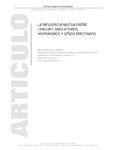
Please use this identifier to cite or link to this item:
http://ricaxcan.uaz.edu.mx/jspui/handle/20.500.11845/1027Full metadata record
| DC Field | Value | Language |
|---|---|---|
| dc.contributor | 253008 | es_ES |
| dc.coverage.spatial | Global | es_ES |
| dc.creator | D´Amore Wilkinson, Anna Maria | - |
| dc.date.accessioned | 2019-05-28T20:12:45Z | - |
| dc.date.available | 2019-05-28T20:12:45Z | - |
| dc.date.issued | 2009-03-10 | - |
| dc.identifier | info:eu-repo/semantics/publishedVersion | es_ES |
| dc.identifier.issn | 1607-6079 | es_ES |
| dc.identifier.uri | http://ricaxcan.uaz.edu.mx/jspui/handle/20.500.11845/1027 | - |
| dc.description | English currently has an influence on Spanish to a degree that many find alarming. Especially worrying for them is the adoption of English words for already existing Spanish ones, or instead of creating a neologism, a new term, in the field of technology. However, the historical flow between the two languages has not been one-way, as English has also adopted many words from the Spanish language. Furthermore, in their interaction with other languages, both Spanish and English throughout their history have both loaned and borrowed vocabulary. It is worth mentioning that the current status of English as a global language makes it the vehicle of knowledge and culture, the means of contemporary international communication, a situation that consequently impacts on the majority of the world’s languages today, not just Spanish. Linguistic change is an inevitable part of the constant evolution that human society undergoes. Purists and academies may delay in accepting innovation, but history teaches us that the prolonged use of vocabulary, whether loanwords from other languages or neologisms, eventually leads to acceptance and formal adoption in the standard language. | es_ES |
| dc.description.abstract | La lengua inglesa actualmente ejerce un grado de influencia sobre la lengua española que muchos encuentran alarmante. En especial, preocupa la adopción de palabras inglesas en substitución de léxico español ya existente, o en lugar de la creación de un neologismo, un nuevo término, en el campo de la tecnología. Sin embargo, el flujo histórico entre estas dos lenguas no ha sido unidireccional, puesto que el inglés también ha adoptado muchas palabras de la lengua española. Además, en la interacción con otras lenguas, tanto el español como el inglés han prestado y tomado prestado vocabulario a lo largo de la historia. Cabe señalar que el estatus actual del inglés como lengua global lo vuelve el vehículo de los conocimientos y la cultura, la vía de la comunicación internacional contemporánea, situación que tiene como consecuencia el impacto sobre la mayoría de las lenguas en la actualidad, no sólo el español. El cambio lingüístico es una parte inevitable de la evolución constante que experimenta la sociedad humana. Puristas y academias pueden tardar en aceptar la innovación, pero nos enseña la historia que el uso prolongado de vocabulario, trátese de préstamos de otras lenguas o de neologismos, finalmente conduce a la aceptación y la adopción formal en la lengua estándar. | es_ES |
| dc.language.iso | spa | es_ES |
| dc.publisher | Coordinación de Publicaciones Digitales. DGSCA-UNAM | es_ES |
| dc.relation.uri | generalPublic | es_ES |
| dc.rights | Atribución-NoComercial-CompartirIgual 3.0 Estados Unidos de América | * |
| dc.rights.uri | http://creativecommons.org/licenses/by-nc-sa/3.0/us/ | * |
| dc.source | Revista digital universitaria, Vol. 10, No 3, 10 de marzo de 2009. | es_ES |
| dc.subject.classification | HUMANIDADES Y CIENCIAS DE LA CONDUCTA [4] | es_ES |
| dc.subject.other | Lingüística histórica | es_ES |
| dc.subject.other | préstamos lingüísticos | es_ES |
| dc.subject.other | anglicismo | es_ES |
| dc.subject.other | hispanismo | es_ES |
| dc.subject.other | neologismo | es_ES |
| dc.subject.other | Historical linguistics | es_ES |
| dc.subject.other | loanwords | es_ES |
| dc.subject.other | anglicism | es_ES |
| dc.subject.other | hispanism | es_ES |
| dc.subject.other | neologism | es_ES |
| dc.title | La influencia mutua entre lenguas: anglicismos, hispanismos y otros préstamos | es_ES |
| dc.type | info:eu-repo/semantics/article | es_ES |
| Appears in Collections: | *Documentos Académicos*-- UA Estudio de las Humanidades | |
Files in This Item:
| File | Description | Size | Format | |
|---|---|---|---|---|
| La influencia mutua entre lenguas.pdf | 279,11 kB | Adobe PDF |  View/Open |
This item is licensed under a Creative Commons License
